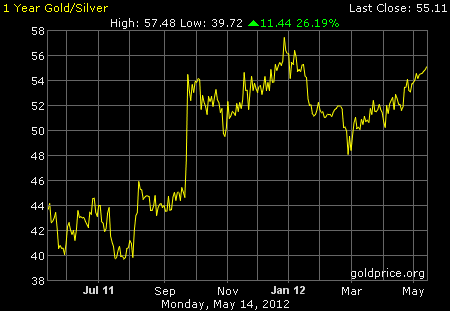Oxford Economics: Impact of Inflation and Deflation on the case for Gold
-
Since the 2007 Global Financial Crisis, considered by many economists to be the worst financial crisis since the Great Depression, the global economy has been facing a complex inflation/deflation paradox. Many emerging economies are experiencing high inflation in the form of rapidly rising food and energy prices, while more developed western nations are facing high unemployment, low growth, lower inflation and even deflation in some cases.
While economists debate over whether inflation or deflation would take hold, with some arguing that both are coexisting in many economies, investors weary of the currency crises and sovereign debt crises are loosing confidence in the more traditional asset classes and are increasingly flocking to gold as a safe haven.
It is therefore timely that the World Gold Council recently commissioned Oxford Economics to conduct an independent, proprietary research using their respected Global Model, to explore the performance of gold and other assets in various economic situations and examine gold’s role within in an efficient investment portfolio in divergent economic scenarios.
This video outlines how the study was carried out and some broad conclusions drawn from it.
-
-
Some of the key conclusions of this study include:-
Gold tends to hold its value in real terms over the long term, but short-run factors like financial stress, political turmoil, real interest rates, inflation and central bank activity can move gold away from its long run equilibrium for extended periods.
-
Whilst the current price of gold is comparatively high, the adjustment back to equilibrium could take place via a rise in the general price level, rather than a fall in the nominal value of gold.
-
Gold performs relatively strongly in a high inflation scenario and also quite well in a deflationary environment - such as during a wave of defaults in the eurozone.
-
Gold is a hedge against extreme events - this may be especially valuable given the considerable uncertainties still facing the world economy.
-
Gold is useful in stabilizing the performance of a portfolio because it has a lack of correlation with other financial assets (equities, bonds, cash and property).
-
Summarized below are the results of the relative performance of gold against other financial assets under four scenarios (Baseline, Deflation, Stagflation & Inflation). The full report in pdf can be downloaded from the World Gold Council site. Registration is required, but it’s free.
-
Scenario #1
Baseline
Steady economic recovery, moderate inflation & gradual normalisation of financial conditions.
- Steady recovery in major economies supported by strong emerging market growth
- Easing of financial stress and repair of banking systems
- Modest inflation, gradual normalisation of monetary policy, slight dollar appreciation
- Gold under performs other assets (Ranking 1 out of 5)
-
Scenario #2
Deflation
Massive financial shock leading to renewed recession and falling consumer prices
- Major global financial shock, eurozone debt defaults, surge in financial stress levels
- Return to recession in major economies, sharp growth slowdown in emerging countries
- Price deflation in many countries, steep asset price falls, near zero interest rates
- Gold performance helped by sharp initial rise in financial stress (Ranking 3 out of 5)
-
Scenario #3
Stagflation
Higher inflation and interest rates but weaker growth than in the baseline
- Oil price spike to US$150 per barrel sparks increased wage pressures
- Inflation rises to 5% and sticks there, central banks react with higher interest rates
- Growth grinds to a halt, financial stress rises
- Gold performs better relative to the baseline scenario (Ranking 2 out of 5)
Scenario #4
High Inflation
Wage-price spiral and lax monetary policy pushing inflation to double digits and ultimately leading to a sharp monetary tightening and recession.
- Faster than expected initial growth closes output gaps
- Oil soars to US$200, creating wage-price spiral as central banks are slow to respond
- Double-digit inflation, belated rate hikes causing recession & a spike in financial stress
- Gold outperforms other financial assets in this scenario (Ranking 5 out of 5)
-
Further Reading:
-
-


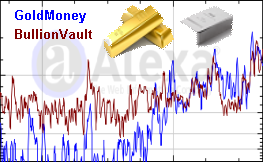

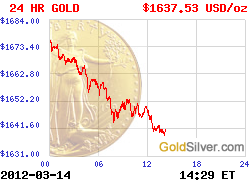
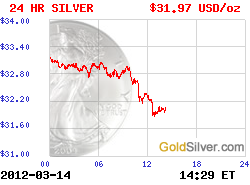
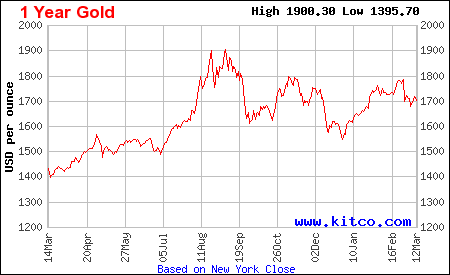 More Charts: 1-Month, 1-Year, 5-Year, 10-Year
More Charts: 1-Month, 1-Year, 5-Year, 10-Year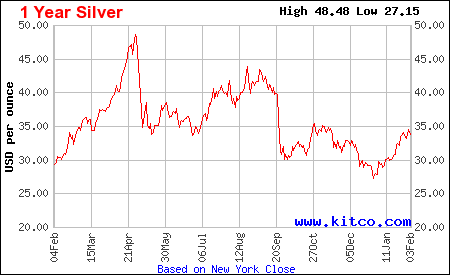 More Charts: 1-Month, 1-Year, 5-Year, 10-Year
More Charts: 1-Month, 1-Year, 5-Year, 10-Year